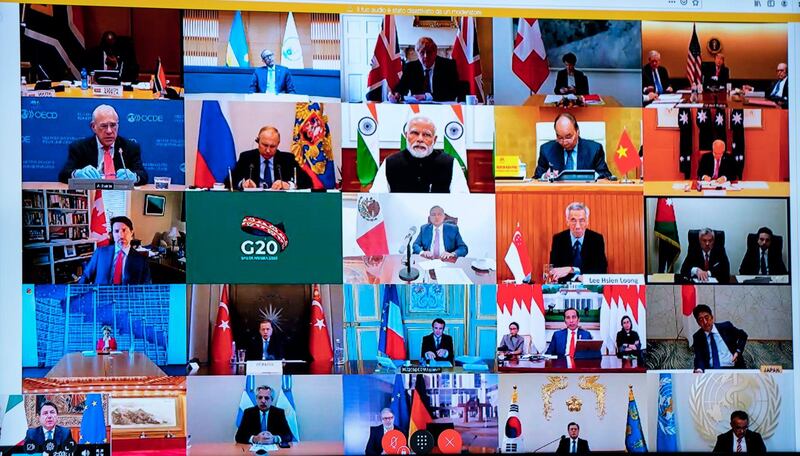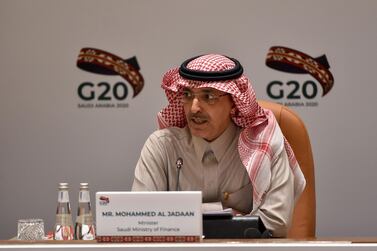Financial policymakers from the world’s 20 biggest economies have agreed to suspend debt repayments from the world's poorest countries, giving them headroom to dedicate cash to fight the coronavirus.
Both principal repayments and interest payments will be suspended from May 1 until the end of the year, the G20 said in a joint statement following the group’s finance ministers and central bankers' virtual meeting on Wednesday. They also asked private creditors to join the initiative "on comparable terms".
The initiative accommodates all International Development Association-countries that are currently on any debt service plan to the International Monetary Fund and the World Bank. All of the least developed nations, as defined by the UN, will also benefit, and creditors will consider a possible extension to the debt freeze later this year, it said.
"We are determined to spare no effort, both individually and collectively, to protect lives, overcome the pandemic, safeguard people’s jobs and incomes, support the global economy during and after this phase and ensure the resilience of the financial system," the G20's finance ministers and central bankers said in a communique.
All G20 members agreed to an action plan that includes a comprehensive IMF package and support measures proposed by the World Bank and other multilateral lenders that collectively amounts to $200 billion (Dh734bn).
All bilateral official creditors will participate in the initiative. The G20 also called on multilateral development banks to further explore options for the suspension of debt service payments over the period, according to the statement.
“Our aim with the action plan is to support the necessary health response and [take] measures … preventing a liquidity crisis turning into a solvency crisis and global recession becoming a global depression, Saudi Arabia's finance minister Mohammed Al Jadaan said at a joint teleconference with the country’s central bank governor, Ahmed Al Kholifey, after the meeting. Saudi Arabia has the G20 rotating presidency this year.
The G20 move is part of efforts to support the global economy during the pandemic and ensure financial stability. The group has already poured more than $7 trillion into the global economy to support businesses and stem job losses as Covid-19 continues to spread across Asia, the Middle East, Europe and North America. The United Nations last month called for a separate $2.5tn package by the G20 to help developing economies cope with the pandemic.
Covid-19, as the illness is called by the World Health Organisation, has infected more than 2 million people globally and killed about 129,000, according to the Johns Hopkins University, which is tracking its spread. More than 500,000 people have recovered.
The global economy is facing its greatest crisis since the Great Depression in the 1930s and is projected to shrink 3 per cent in 2020, the IMF said on Tuesday. The Washington-based fund’s growth forecast for this year has been revised down more than 6 percentage points, relative to its October 2019 estimates and updated January 2020 projections of a 3.3 per cent increase in global gross domestic product.
The IMF managing director Kristalina Georgieva and the World Bank Group’s president David Malpass welcomed the G20's move to suspended debt servicing from nations in need of support.
“This is a powerful, fast-acting initiative that will do much to safeguard the lives and livelihoods of millions of the most vulnerable people,” they said in a joint statement. “The World Bank Group and [the] IMF will move quickly to respond to the G20’s request for us to support this action by working closely with these countries in ways that make the best use of this vital lifeline.”
Mr Georgieva earlier said that the IMF is discussing a new “short-term liquidity line for countries with strong policies”. To assist its low-income members, the lender plans to triple its concessional lending.
“We are … urgently seeking $18bn in new loan resources for the Poverty Reduction and Growth Trust, and will also likely need at least $1.8bnin subsidy resources,” she said in a separate statement issued earlier on Wednesday.
The IMF executive board on Tuesday approved an immediate debt relief package for 25 countries struggling to cope with the economic effects of the coronavirus pandemic. The relief package, under the fund's revamped Catastrophe Containment and Relief Trust, provides grants to its most vulnerable members to cover their IMF debt obligations for an initial phase over the next six months.
Of the IMF's 189 members, 100 countries have approached it for emergency financing.
"That's the kind of support that will be needed," the IMF's chief economist Gita Gopinath told The National on Tuesday.
The fund is looking to double its emergency financing to $100bn to help struggling economies. It will make its entire $1tn financial capacity available to meet requests for funding.









